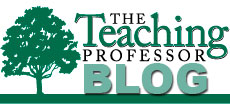 “Why should we change the way we teach?” a marketing professor asked with an honest gaze and a smile that bespoke sincerity. It was early in a workshop session just after I’d introduced the idea of learner-centered teaching and explained why students should be doing more of the learning tasks themselves.
“Why should we change the way we teach?” a marketing professor asked with an honest gaze and a smile that bespoke sincerity. It was early in a workshop session just after I’d introduced the idea of learner-centered teaching and explained why students should be doing more of the learning tasks themselves.
CURRENT ARTICLE • June 01
OTHER RECENT ARTICLES
Handling complaints is one of the defining roles of academic administration. It demands perseverance, good listening skills, tact, and adherence to institutional policies and legal requirements. In an interview with Academic Leader, C.K. Gunsalus, author of The Academic Administrator’s Survival Guide (which includes an entire chapter on complaints), offered advice on how to manage this important role.
Read More ›When things don’t go well in a class, it never generates good feelings. It takes courage to address the reasons why. What if the teacher discovers it’s her fault? It takes even more courage to explore with a colleague what happened and the most courage of all to share in print the tale of a class gone awry. I have a small but growing resource list of just such public disclosures—they attest to how much an instructor can learn by facing what happened and how much others can learn by reading these accounts. I have a new article to add to that collection.
Read More ›Deep and surface learning are terms familiar to most faculty. What is known by most is that these terms describe two different approaches to learning. Beyond that, most faculty knowledge is sketchy, although there has been quite a bit of educational research on the topic. I’ve been reviewing this seminal research—it is interesting and worth a revisit so that we might “deepen” our knowledge of what’s involved.
Read More ›Magna Publications and The Teaching Professor announce winners of the Maryellen Weimer Scholarly Work on Teaching and Learning Award
At the 2011 Teaching Professor Conference, Magna Publications and The Teaching Professor announced the winners of the Maryellen Weimer Scholarly Work on Teaching and Learning Award. Now in its third year, the award recognizes outstanding scholarly contributions with the potential to advance college-level teaching and learning practices.
Read More ›Technology is everywhere. Some people are addicted to it and refuse to live without it. College students will say that their laptop, phone, and iPod are necessities comparable to food. So how can professors remove these technological items from the hands of the student and still keep them engaged in class discussions? Through another form of widely used technology: YouTube. Students enjoy viewing and sharing visual content online. Visual tools create a connection between the content and viewer (McKenzie, 2008). Many videos on YouTube are academic and professional in nature and when used properly will reinforce classroom discussions and engage college students due to the images and audio used (Cardine, 2008).
Read More › Students frequently wonder and sometimes ask, “Why are we doing this? Why do I need to know this? Why are we spending so much time on this? Why do we have to do this busywork?”
Students frequently wonder and sometimes ask, “Why are we doing this? Why do I need to know this? Why are we spending so much time on this? Why do we have to do this busywork?”
All too often students shuffle into class, take notes while the professor lectures for 50 minutes or so, and then pack up and leave. Rinse and repeat throughout the semester. Some might never raise their hand, offer their opinion, or even learn the name of the person sitting in front of them.
Read More ›Our institution has recently completed its third year of personnel reviews that rely completely on electronic portfolios. All retention, promotion, and instructional academic staff rehiring decisions now depend on electronic portfolios drawn from a common source, as do all internal annual reports and some external reports.
Read More ›The close of the academic year brings with it the end of courses and the usual student ratings of those courses. Among many concerns related to this activity are those pertaining to the presence of certain items on the form. They ask irrelevant questions, given what and how we teach. Of course, that doesn’t seem to prevent students from offering evaluations in those areas.
Read More ›




